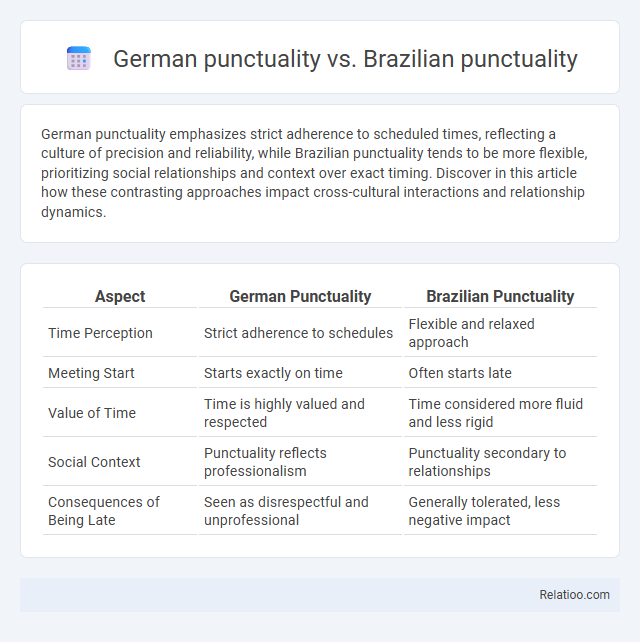German punctuality emphasizes strict adherence to scheduled times, reflecting a culture of precision and reliability, while Brazilian punctuality tends to be more flexible, prioritizing social relationships and context over exact timing. Discover in this article how these contrasting approaches impact cross-cultural interactions and relationship dynamics.
Table of Comparison
| Aspect | German Punctuality | Brazilian Punctuality |
|---|---|---|
| Time Perception | Strict adherence to schedules | Flexible and relaxed approach |
| Meeting Start | Starts exactly on time | Often starts late |
| Value of Time | Time is highly valued and respected | Time considered more fluid and less rigid |
| Social Context | Punctuality reflects professionalism | Punctuality secondary to relationships |
| Consequences of Being Late | Seen as disrespectful and unprofessional | Generally tolerated, less negative impact |
Introduction: Understanding Punctuality in Different Cultures
German punctuality is globally recognized for its strict adherence to schedules, reflecting a cultural value of efficiency and respect for others' time, while Brazilian punctuality tends to be more flexible, emphasizing social relationships over rigid timing norms. Understanding punctuality in different cultures reveals how societal values shape time perception, with Germans viewing punctuality as professionalism and reliability, and Brazilians prioritizing personal interactions and spontaneity. These contrasting approaches highlight the importance of cultural context in interpreting punctuality, impacting international business and social interactions.
Historical Roots of German Punctuality
German punctuality stems from a historical emphasis on industrial precision and disciplined time management during the Industrial Revolution, shaping societal values around reliability and efficiency. Brazilian punctuality, influenced by cultural flexibility and social rhythms, contrasts with this rigidity, often reflecting a more relaxed approach to time. Understanding these differences helps you navigate international interactions with greater cultural sensitivity and respect.
The Cultural Significance of Time in Brazil
The cultural significance of time in Brazil reflects a more flexible approach to punctuality, where social relationships often take precedence over strict adherence to schedules. Unlike Germany's reputation for precise punctuality, Brazilian society values personal interactions and may view time more fluidly, with delays considered acceptable in many contexts. This contrast highlights how cultural norms shape perceptions of time management and social expectations across different countries.
Social Expectations: Being On Time in Germany
In Germany, punctuality is a critical social expectation, with strict adherence to time reflecting respect and reliability, whereas Brazil often exhibits a more relaxed approach to timeliness, where flexibility is socially acceptable. German culture associates being on time with professionalism and trustworthiness, and lateness can be perceived as disrespectful or irresponsible. Understanding these cultural differences is essential for effective social and business interactions between Germans and Brazilians.
Flexible Time Perception: The Brazilian Approach
German punctuality is characterized by strict adherence to schedules, reflecting a cultural emphasis on precision, reliability, and respect for time. In contrast, Brazilian punctuality embodies a more flexible time perception, where social interactions and relational harmony often take precedence over exact timing, resulting in a relaxed attitude toward deadlines and appointments. This flexible approach to time in Brazil is deeply rooted in its cultural values, fostering adaptability but sometimes leading to challenges in formal or multicultural business settings where punctuality is strictly observed.
Punctuality in the Workplace: Germany vs Brazil
Punctuality in the workplace varies significantly between Germany and Brazil, with Germany emphasizing strict adherence to schedules and valuing timeliness as a key component of professionalism. In contrast, Brazilian work culture often exhibits a more flexible approach to time, where slight delays are socially acceptable and relationships may take precedence over rigid deadlines. Understanding these cultural differences helps you navigate international business interactions more effectively, ensuring respectful communication and collaboration.
Impact on Business and Professional Relationships
German punctuality is renowned for its precision, fostering trust and efficiency in business dealings that promote seamless collaboration and strict adherence to deadlines. Brazilian punctuality tends to be more flexible, often requiring patience and cultural understanding to maintain strong professional relationships despite varied meeting start times. The contrast in punctuality norms significantly impacts international business interactions, with Germans valuing timeliness as a sign of respect and Brazilians emphasizing relationship-building, necessitating adaptive communication strategies for successful cooperation.
Social Gatherings and Public Events: Contrasting Norms
German punctuality in social gatherings and public events prioritizes strict adherence to scheduled times, reflecting cultural values of respect and efficiency. Brazilian punctuality tends to be more flexible, with social events often starting later than announced, emphasizing relationships and relaxed interactions. Your experience at such events will vary greatly, with Germans expecting precise timing while Brazilians accommodate more fluid social dynamics.
Coping Strategies for Cross-Cultural Situations
German punctuality often emphasizes strict adherence to scheduled times, reflecting a cultural value of reliability and respect for others' time, whereas Brazilian punctuality tends to be more flexible, accommodating social interactions and relationship-building. Effective coping strategies in cross-cultural situations include setting clear expectations early, allowing buffer time for meetings, and demonstrating cultural sensitivity by adapting to local norms without compromising critical deadlines. Utilizing communication tools and confirming appointments can help bridge differences between the German focus on precision and the Brazilian emphasis on relational timing.
Conclusion: Navigating Punctuality Across Cultures
German punctuality emphasizes strict adherence to schedules, reflecting a cultural value of efficiency and respect for others' time. Brazilian punctuality is more flexible, often influenced by social context and relationship dynamics, prioritizing personal interactions over rigid timing. Navigating punctuality across cultures requires understanding these differences to foster effective communication and mutual respect in international settings.

Infographic: German punctuality vs Brazilian punctuality
 relatioo.com
relatioo.com